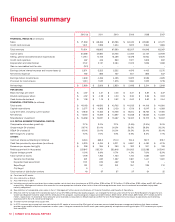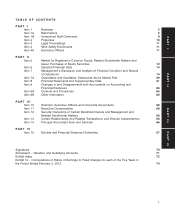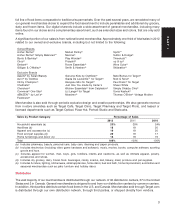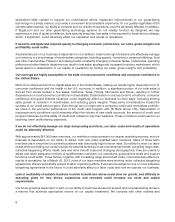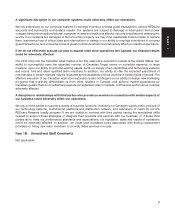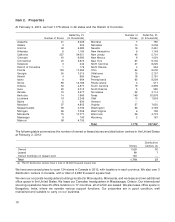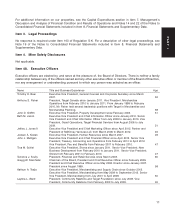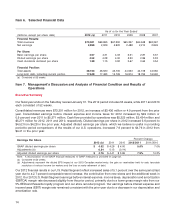Target 2012 Annual Report Download - page 23
Download and view the complete annual report
Please find page 23 of the 2012 Target annual report below. You can navigate through the pages in the report by either clicking on the pages listed below, or by using the keyword search tool below to find specific information within the annual report.
businesses for suitable locations for our stores. In addition, for many sites we are dependent on a third party
developer’s ability to acquire land, obtain financing and secure the necessary zoning changes and permits for a
larger project, of which our store may be one component. Turmoil in the financial markets may make it difficult for
third party developers to obtain financing for new projects. Local land use and other regulations applicable to the
types of stores we desire to construct may affect our ability to find suitable locations and also influence the cost of
constructing, expanding and remodeling our stores. A significant portion of our expected new store sites is located
in fully developed markets, which is generally a more time-consuming and expensive undertaking than expansion
into undeveloped suburban and ex-urban markets.
Interruptions in our supply chain or increased commodity prices and supply chain costs could adversely
affect our gross margins, expenses and results of operations.
We are dependent on our vendors to supply merchandise in a timely and efficient manner. If a vendor fails to deliver
on its commitments, whether due to financial difficulties or other reasons, we could experience merchandise
out-of-stocks that could lead to lost sales. In addition, a large portion of our merchandise is sourced, directly or
indirectly, from outside the United States, with China as our single largest source. Political or financial instability,
trade restrictions, the outbreak of pandemics, labor unrest, transport capacity and costs, port security, weather
conditions, natural disasters or other events that could slow port activities and affect foreign trade are beyond our
control and could disrupt our supply of merchandise and/or adversely affect our results of operations. In addition,
changes in the costs of procuring commodities used in our merchandise or the costs related to our supply chain,
including labor, fuel, tariffs, and currency exchange rates could have an adverse effect on gross margins, expenses
and results of operations.
Failure to address product safety concerns could adversely affect our sales and results of operations.
If our merchandise offerings, including food, drug and children’s products, do not meet applicable safety standards
or our guests’ expectations regarding safety, we could experience lost sales and increased costs and be exposed
to legal and reputational risk. All of our vendors must comply with applicable product safety laws, and we are
dependent on them to ensure that the products we buy comply with all safety standards. Events that give rise to
actual, potential or perceived product safety concerns, including food or drug contamination, could expose us to
government enforcement action or private litigation and result in costly product recalls and other liabilities. In
addition, negative guest perceptions regarding the safety of the products we sell could cause our guests to seek
alternative sources for their needs, resulting in lost sales. In those circumstances, it may be difficult and costly for us
to regain the confidence of our guests.
If our efforts to protect the security of personal information about our guests and team members are
unsuccessful, we could be subject to costly government enforcement actions and private litigation and our
reputation could suffer.
The nature of our business involves the receipt and storage of personal information about our guests and team
members. We have a program in place to detect and respond to data security incidents. To date, all incidents we
have experienced have been insignificant. If we experience a significant data security breach or fail to detect and
appropriately respond to a significant data security breach, we could be exposed to government enforcement
actions and private litigation. In addition, our guests could lose confidence in our ability to protect their personal
information, which could cause them to discontinue usage of REDcards, decline to use our pharmacy services, or
stop shopping with us altogether. The loss of confidence from a significant data security breach involving team
members could hurt our reputation, cause team member recruiting and retention challenges, increase our labor
costs and affect how we operate our business.
7
PART I



